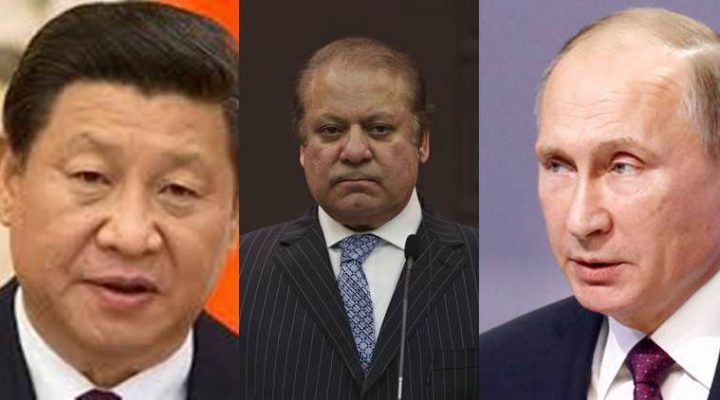By Abdus Sattar Ghazali
Beijing and Moscow have come to Pakistan’s defense in light of President Donald Trump’s Afghan and Pakistan strategy unveiled on Monday.
After China’s strong message defending Pakistan’s role in Afghanistan and asking the global community to acknowledge its sacrifices in war against terrorism, Russia has echoed similar sentiments following US President Donald Trump’s allegations that Pakistan was offering safe haven to terrorists.
Russian Presidential Envoy to Afghanistan Zamir Kabulov slammed Trump’s Pakistan strategy and insisted that Islamabad is “a key regional player to negotiate with.”
“Putting pressure [on Pakistan] may seriously destabilize the region-wide security situation and result in negative consequences for Afghanistan,” the presidential envoy to Kabul told Russia’s ‘Afghanistan’ daily.
Earlier in a phone call to US Secretary of State Rex Tillerson, China’s top diplomat Yang Jiechi urged the US to value Pakistan’s role in Afghanistan.
“We must value Pakistan’s important role on the Afghanistan issue, and respect Pakistan’s sovereignty and reasonable security concerns,” the diplomat said.
Trump, in his first address to the nation as commander-in-chief on Monday, lambasted Pakistan for ‘harboring militants’.
“We have been paying Pakistan billions and billions of dollars at the same time they are housing the very terrorists that we are fighting,” he said, warning that vital aid could be cut. “That will have to change and that will change immediately.”
In reaction to Trump’s speech, Pakistan’s Ambassador to United States Aizaz Ahmad has reaffirmed Pakistan’s stance that, ‘there are no safe havens for terrorists in Pakistan’.
He also regretted the US failure to acknowledge the huge sacrifices of Pakistan in the war on terror. Similar statement was also issued by the country’s Foreign Office which also reasserted Pakistan’s continuous efforts in combating terrorism.
Russia says Trump’s new strategy is ‘dead end’
Moscow believes that Washington’s bet on using of force in U.S. President Donald Trump’s new strategy for Afghanistan is “a dead end”, Russian Foreign Minister Sergei Lavrov told a news conference on Thursday (August 24).
“The main emphasis in the new strategy, which was announced by Washington, is made on settlement through use of force … we believe that it’s a dead-end approach,” Russia’s Foreign Minister Sergei Lavrov told reporters.
His comments were echoed in a news conference held in Moscow by the foreign ministry spokesperson Maria Zakharova who likewise criticized the focus on a “military solution to the Afghan issue, including through beefing up foreign military contingents.”
“This approach is in tune with the prescriptions for Afghanistan issued by the previous U.S. administration, which, as is known, failed to improve the security in the region,” she added.
“For our part, we are willing to continue to assist Kabul in training and equipping its national security forces as the main guarantor of security in Afghanistan, as well as in advancing the national reconciliation process.”
Pakistan to move closer to China and Russia
As Trump’s Pakistan strategy eclipses U.S.-Pakistan relations, Islamabad could seek deeper ties with Moscow and Beijing, according to two unnamed senior Pakistan officials cited by The Express Tribute ahead of the U.S. President’s announcement. Two officials familiar with Pakistan’s foreign policy plans said the Pakistani government would have “no option” but to further enhance its cooperation with both China and Russia.
According to Polina Tikhonova of Value Talk, the Pak-China diplomatic and military friendship has been steady for the past few decades, with their economic partnership reaching new heights in light of China’s announcements regarding the China-Pakistan Economic Corridor (CPEC) project in 2014. Russia, for its part, has gravitated towards Islamabad only recently.
The two former Cold War-era rivals managed to put their differences behind them and step up their diplomatic, military and economic cooperation in recent years, Tikhonova said adding: In 2014, Moscow lifted the decades-old embargo on arms sales to Pakistan, and later that year, the two nations signed an agreement to expand their military ties, striking an energy deal worth $1.7 billion. In 2016, the Pak-Russian defense partnership reached new highs with the Pakistani Army and Russian Army carrying out unprecedented joint military exercises under the name of “Friendship 2016.”
Later this week, a Pakistani delegation is expected to attend Russia’s Army 2017 exhibition, as announced by Pakistani Ambassador to Russia Qazi Khalilullah last week. At an event dedicated to the 70th anniversary of Pakistan’s independence, Khalilullah also vowed that Islamabad and Moscow will increase their partnership in areas of mutual interest, including in the energy and defense sectors.
Trump’s request for India’s help in Afghanistan rattles Pakistan
President Trump’s appeal for India’s help on Afghanistan set off alarm bells in Pakistan, where officials warned that the approach risked jolting a tumultuous relationship, the New York Times reported Tuesday.
As part of Mr. Trump’s new plan for addressing the 16-year United States conflict in Afghanistan, he asked India to “help us more,” especially with economic assistance, the NYT report said adding:
“Pakistani officials have cited Indian influence as a primary cause of instability and insecurity in Afghanistan. Officials in Islamabad accuse India of supporting a hostile political regime in Kabul and funding militants, who use Afghanistan as a base to launch attacks inside Pakistan.
“Analysts said Pakistan’s dependence on American aid had declined in recent years — partly as China flexes its military might in South Asia — giving policy makers in Islamabad more room to maneuver.
“Pakistan is prepared to absorb the impact of a more assertive U.S. policy toward the country,” said Arif Rafiq, a nonresident fellow at the Middle East Institute in Washington.
“It’s the most economically stable that it’s been in a decade, thanks in part to massive Chinese investment, and it has managed to secure much of its border regions despite the withdrawal of most U.S. combat forces.”
Mr. Rafiq said that Pakistan also knows that it has several options to counter punitive actions by Washington, including closing supply routes to Afghanistan.
Abdus Sattar Ghazali is the chief editor of the Journal of America (www.journalofamerica.net) Email: asghazali2011 (@) gmail.com










